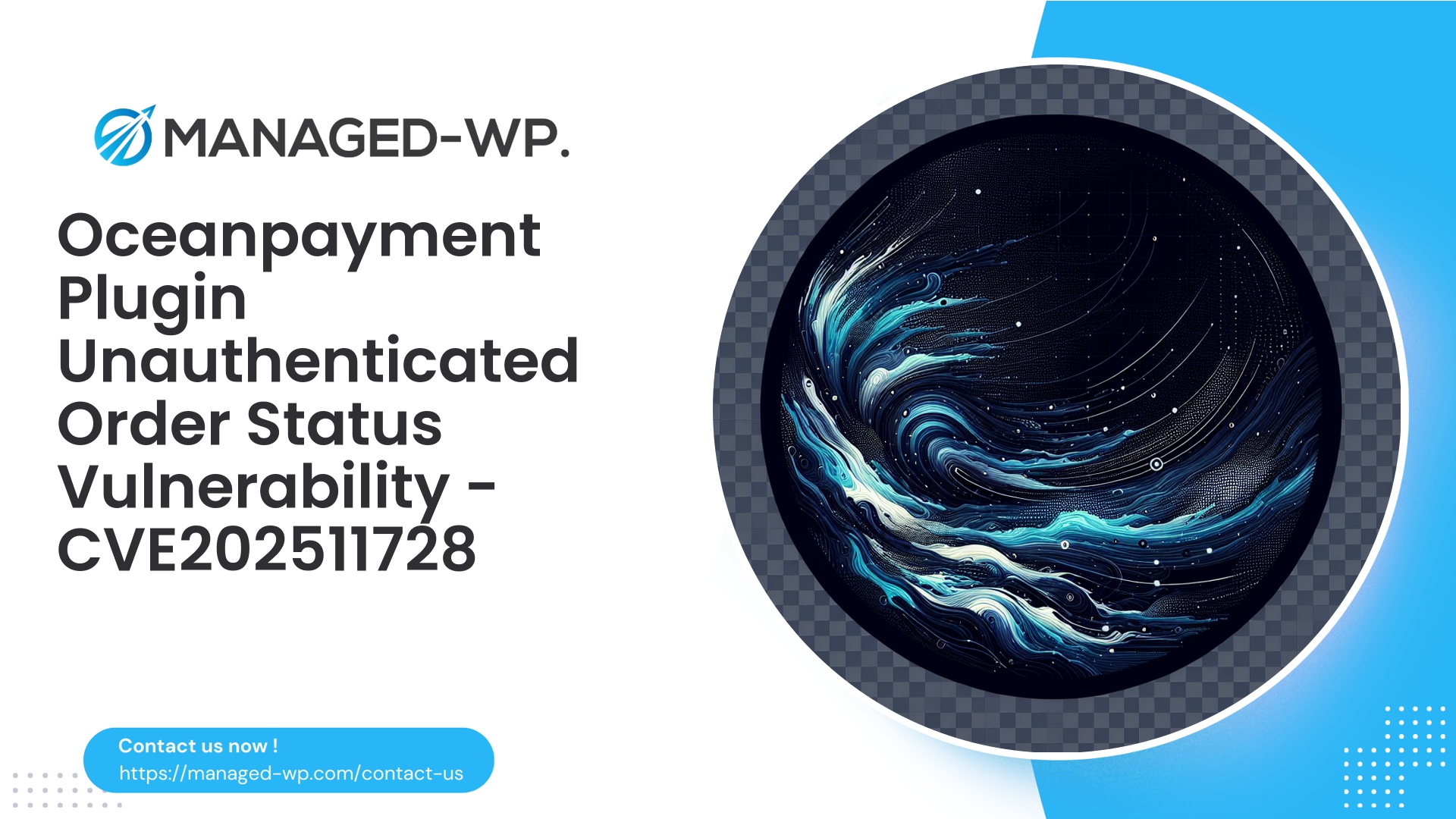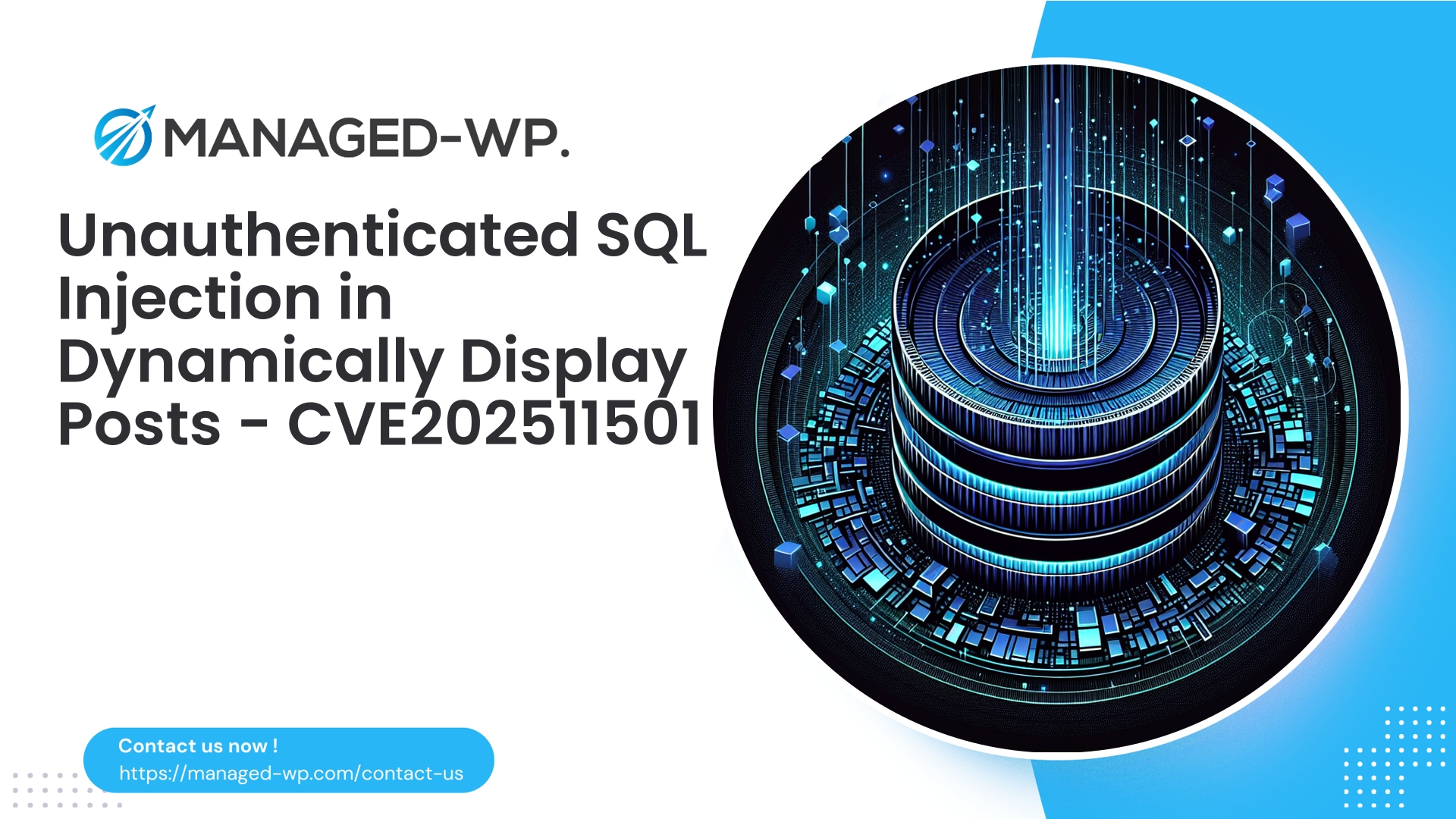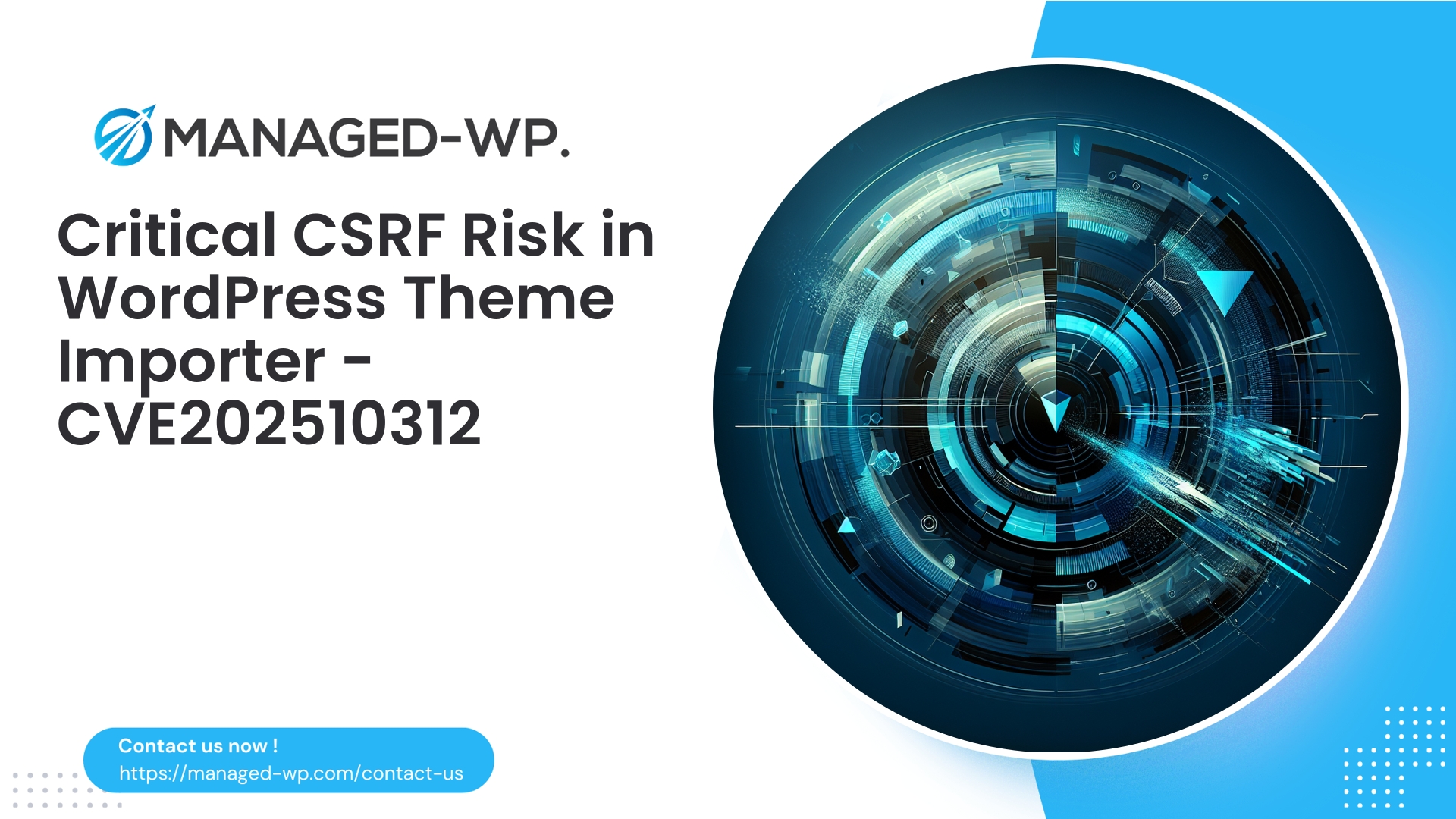| 插件名稱 | Oceanpayment信用卡網關 |
|---|---|
| 漏洞類型 | 關鍵功能缺少身份驗證 |
| CVE編號 | CVE-2025-11728 |
| 緊急 | 低的 |
| CVE 發布日期 | 2025-10-15 |
| 來源網址 | CVE-2025-11728 |
Oceanpayment 信用卡閘道(<= 6.0)-缺乏身分驗證機制,導致未經身分驗證的訂單狀態被竄改(CVE-2025-11728)
作者: 託管式 WordPress 安全專家
日期: 2025-10-15
本安全公告概述了 Oceanpayment CreditCard Gateway WordPress 外掛程式(6.0 及以下版本)中的一個嚴重安全漏洞。該漏洞由於缺乏適當的身份驗證控制,允許未經身份驗證的用戶修改 WooCommerce 網站上的訂單狀態。該漏洞編號為 CVE-2025-11728,由安全研究員 Jonas Benjamin Friedli 發現,目前尚未發布官方修補程式。本簡報詳細分析了該漏洞及其對電子商務營運商的影響,並提供了可立即實施的緩解策略、虛擬修補建議、回應協議和最佳實踐——所有內容均基於 Managed-WP 安全團隊的專業知識和經驗。
為什麼這種漏洞會對網路商家構成威脅
對於依賴 WooCommerce 並整合外部支付網關的商家而言,訂單狀態更新的完整性至關重要。利用此漏洞的攻擊者可以:
- 以欺詐手段將未付款訂單標記為已付款,導致經濟損失和會計記錄失真。
- 取消或退款合法訂單,會影響訂單履行和客戶滿意度。
- 觸發有害的自動化工作流程,例如出貨排程或通知電子郵件,從而導致營運和聲譽損害。
- 產生不一致或衝突的訂單狀態,使偵測、協調和事件補救變得複雜。
鑑於支付回調和 webhook 端點通常繞過人工審核流程,這種缺失的存取控制為攻擊者提供了一個危險的途徑,使其能夠可靠地、無需身份驗證地更改業務關鍵數據,從而可能立即產生不利影響。
漏洞技術概述
- Oceanpayment 信用卡網關外掛程式公開了一個 HTTP 端點或 webhook 處理程序,該程序接受請求而無需身份驗證或授權。
- 此端點可遠端調用,並允許直接修改 WooCommerce 訂單狀態。
- 沒有實現隨機數、使用者能力檢查、共享金鑰或 HMAC 驗證,這使得任何未經身份驗證的參與者都可以更改訂單。
CVE ID: CVE-2025-11728
研究資料來源: 喬納斯·本傑明·弗里德利
常見攻擊途徑
- 訂單確認詐欺: 攻擊者會錯誤地將訂單標記為“處理中”或“已完成”,這可能會導致貨物在未付款的情況下發貨。
- 退款或取消訂單漏洞: 未經授權的取消或退款請求會擾亂收入和庫存管理。
- 自動化大規模剝削: 在套用修補程式之前,利用腳本進行針對多個易受攻擊網站的掃描和利用。
- 複合攻擊鏈: 未經授權的訂單變更可能被用作注入惡意負載或提升權限的跳板。
可利用性和目標評估
- 利用可能性: 如果易受攻擊的終端暴露在網路上,且沒有 IP 或防火牆限制,則風險非常高。
- 面臨風險的目標: 使用 Oceanpayment CreditCard Gateway 外掛程式 6.0 或更早版本的 WooCommerce 商店。
- 檢測挑戰: 惡意修改嘗試的日誌條目可能與合法流量混淆,除非與訂單資料關聯起來。
入侵指標(IoC)
請留意日誌和訂單審計追蹤中的以下跡象:
- 針對包含 oceanpayment、opay、payment-callback、notify 或 callback 等關鍵字的 URL 的意外 POST/GET 請求。
- 訂單狀態發生變更,但未發生相應的授權支付網關交易。
- 訂單狀態從“待處理”迅速變為“已完成”,但沒有有效的交易 ID。
- 插件啟動後不久,來自同一 IP 區塊的異常大量此類請求聚集在一起。
- 新的自動電子郵件觸發器或管理員通知並非由商店管理員發起。
立即採取的緩解措施
- 立即備份您的整個網站和資料庫,以保存取證資料。
- 調查期間,請考慮將網站置於維護模式。
- 在伺服器端或WAF層對外掛端點實施存取控制:
- 將 HTTP 請求限制在 Oceanpayment 公佈的已知回呼 IP 範圍內。
- 阻止未經身份驗證的請求嘗試更改訂單狀態。
- 如果可行,請暫時停用 Oceanpayment 外掛程式以阻止攻擊嘗試。
- 人工審核近期訂單,並與支付網關報告進行核對。
- 輪換與插件整合相關的任何金鑰或 API 憑證。
- 啟用日誌記錄和監控功能,以偵測進一步的攻擊企圖。
長期補救建議
- 官方插件更新發布後,請立即安裝。
- 強制執行嚴格的 webhook 身份驗證:
- 驗證來源 IP 位址,但不要僅依賴基於 IP 的過濾。
- 實作 HMAC 或加密簽章來驗證訊息完整性。
- 使用時間戳記和隨機數進行新鮮度檢查以防止重播攻擊。
- 在變更訂單狀態之前,請先確認 WordPress 使用者的功能或權限。
- 整合對訂單變更(包括請求上下文)的全面日誌記錄和稽核。
- 僅對已驗證的事件限制自動訂單履行工作流程。
- 審核插件原始程式碼,檢查是否有缺少的安全檢查,特別是針對 ajax 和 REST 端點的安全檢查。
Managed-WP 的虛擬補丁和安全控制
Managed-WP 提供主動式伺服器端保護,可降低此漏洞帶來的風險,直到外掛程式正式修復為止:
- 基於規則的虛擬補丁阻止未經身份驗證的請求試圖更改訂單狀態。
- 請求驗證強制要求存在 HMAC 標頭或預共用金鑰簽章。
- 機器人偵測、速率限制和 IP 位址白名單,用於限製或阻止可疑流量。
- 檢查有效載荷以識別針對訂單狀態變更的可疑參數。
- 即時警報和取證日誌記錄,以實現快速事件回應。
- 無需更改程式碼或更新外掛程式即可實現非侵入式保護。
當補丁程式延遲或環境複雜時,這些控制措施可提供分層防禦策略。
立即部署的 WAF 規則範例
根據您的環境調整這些模板,以最大限度地減少誤報。
1)按IP限制對插件回調的訪問
# 拒絕存取受信任 IP 範圍之外的位置 ~* /wp-content/plugins/oceanpayment[-_a-z0-9]*/(notify|callback|server|return).*$ { 允許 203.0.113.0/24; #ment 替換為已知的存取 IPpay,所有 IPpay,為已知的 1TP Ocean;
2) 強制使用 POST 方法和所需的 HMAC 標頭
如果請求路徑包含“oceanpayment”且請求方法不為“POST”,則阻止請求;如果請求路徑包含“oceanpayment”且請求頭缺少“X-Ocean-HMAC”,則阻止請求。 # 簽章驗證需要在應用層或 WAF 層進行。
3)阻止旨在更改訂單狀態的未經授權的有效載荷
SecRule REQUEST_URI "@contains /oceanpayment" "phase:1,deny,status:403,log,msg:'未經身份驗證的訂單狀態更新被阻止',chain" SecRule REQUEST_BODY "@rx (status=completed|order_status=completed"_status=completed)"
4)對可疑訂單更新模式發出警報
監控與外掛端點相符的 HTTP 請求,並結合指示訂單狀態變更的資料庫寫入,以實現快速偵測和調查。
5)限制重複請求的速率
# 範例偽代碼,用於速率限制:如果請求路徑包含“oceanpayment”,則套用速率限制(每個 IP 每分鐘 10 個請求)。
6)阻止已知的惡意使用者代理程式和掃描器
丟棄沒有使用者代理程式標頭或包含已知掃描器字串且目標為插件端點的請求。
驗證您的 WAF 保護措施
- 使用測試或預發布環境來確認被封鎖的請求,而不會中斷生產環境。
- 確保允許包含有效簽名的合法回調。
- 核對日誌條目與被封鎖和允許的流量是否一致。
- 配置規則觸發警報,以便安全團隊隨時了解狀況。
事件回應工作流程
- 遏制: 阻止端點或停用存在漏洞的插件,必要時隔離受影響的系統。
- 證據保存: 確保所有相關日誌和備份都帶有準確的時間戳記。
- 分診: 將可疑的HTTP請求與訂單變更關聯起來。
- 補救措施: 撤銷未經授權的更改;必要時聯絡客戶和付款網關。
- 根除: 移除或修補插件,輪換密鑰,並套用虛擬補丁。
- 恢復: 在監控到位的情況下恢復服務並確認完整性。
- 報道: 與相關人員溝通,並完整記錄事件經過。
支付網關安全加固最佳實踐
- 相互認證: 實作 HMAC 簽章並在伺服器端進行驗證。
- 核對訂單詳情: 在批准付款前,請交叉核對交易 ID。
- 能力執行: 訂單更新前需要相應的 WordPress 權限或 webhook 身份驗證。
- 安全伺服器配置: 停用不必要的HTTP方法並套用嚴格的內容安全策略。
- 限制自動化: 對於高價值或特殊訂單,需要人工審核。
- 保持系統更新: 定期更新所有外掛程式並刪除未使用的組件。
- 審核自訂端點: 確保所有 admin-ajax 和 REST 端點都強制執行適當的授權檢查。
外掛作者開發建議
- 避免在未經身份驗證的情況下,透過公開可存取的端點更新訂單狀態。
- 使用 WordPress REST API 的 permission_callback 進行端點權限驗證。
- 對公開的 admin-ajax 操作強制執行 nonce 或簽章檢查。
- 要求並驗證 webhook 有效載荷的加密簽章。
- 記錄所有訂單狀態變更及其相關元數據,以便進行審計和故障排除。
範例概念性 Webhook 驗證偽程式碼
# 用來驗證 webhook HMAC 簽章的偽代碼 shared_secret = get_stored_secret() payload = get_raw_request_body() provided_sig = request.headers["X-Hub-Signature"] calculated_sig = "shao256=" +payex_shawred_ secure_compare(provided_sig, calculated_sig): log("Webhook 簽章驗證失敗", request) return http_response(403, "Forbidden") # 繼續處理已授權的 webhook payload
監測和預警建議
- 訂單狀態變更缺少匹配的支付交易時發出警報。
- 檢測標記為已完成但付款金額為零或可疑的訂單。
- 監控來自陌生 IP 位址的插件回呼端點請求激增情況。
- 將警報轉發給值班安保人員和票務系統。
- 維護匯總可疑訂單活動和 webhook 流量的儀錶板。
與客戶和利害關係人溝通
- 及時、透明地與可能受到影響的客戶溝通。
- 明確補救措施和持續保護工作。
- 讓內部團隊了解風險、影響和應對措施的進展。
在等待官方更新期間,虛擬補丁的重要性
透過託管式 Web 應用防火牆進行虛擬修補,無需更改程式碼或更新插件,即可在網路邊緣阻止攻擊嘗試,從而提供即時防禦。 Managed-WP 的虛擬修補優勢包括:
- 快速部署到多個客戶端環境,實現一致的安全性。
- 不受插件開發者修復時間表的限制。
- 對相關攻擊途徑進行集中管理和監控。
虛擬補丁不能取代官方修復,而是在應用和驗證適當的程式碼更新之前的關鍵臨時措施。
快速參考清單
- 立即備份網站檔案和資料庫。
- 審核近期訂單及相應的付款記錄。
- 限製或停用存在漏洞的插件端點。
- 部署 WAF 規則以阻止未經身份驗證的訪問,並要求使用 HMAC 簽署。
- 輪換 API 金鑰、webhook 金鑰和共享憑證。
- 監控是否有進一步的攻擊企圖並設定警報。
- 官方插件更新發布後,請立即安裝並確認問題已解決。
- 考慮聘請 Managed-WP 提供專業的虛擬修補程式和事件回應支援。
Managed-WP 的安全理念與服務
在 Managed-WP,我們優先保護付款和 Webhook 端點,因為它們是 WordPress 安全態勢的關鍵組成部分。我們的託管防火牆服務提供:
- 預先建置、定期更新的虛擬補丁,專門針對已知的 WordPress 外掛漏洞。
- 快速部署回應規則,在供應商修復程式可用之前保護網站。
- 根據您商店獨特的業務流程和威脅概況,建立和調整自訂規則。
- 持續的漏洞情報分析,以及針對 WooCommerce 和 WordPress 的自動化設定審核。
無論是保護單一商店還是企業環境,將官方外掛程式更新與 Managed-WP 的虛擬補丁相結合,都能提供針對不斷演變的威脅的最有效防禦。
立即使用 Managed-WP 的高級防護功能保護您的 WooCommerce 商店
Managed-WP 提供價格親民的基礎套餐,旨在阻止本安全公告中重點提及的未經身份驗證的訂單狀態漏洞利用。該套餐包含託管防火牆、強大的 WAF 規則、惡意軟體掃描以及針對 OWASP Top 10 威脅的緩解措施,可在您等待插件供應商修補程式期間提供強大的防禦層。
方案選項:
- 基本(免費):託管防火牆、無限頻寬、WAF、惡意軟體掃描、OWASP Top 10 防護。
- 標準版($50/年):增加自動惡意軟體清除和 IP 黑名單/白名單功能。
- 專業版($299/年):包含每月安全報告、自動虛擬修補程式和企業客戶的進階功能。
結語和負責任的披露
- CVE標識符: CVE-2025-11728
- 安全研究員: 喬納斯·本傑明·弗里德利(署名)
- 所有使用 Oceanpayment 信用卡閘道 ≤ 6.0 的 WooCommerce 商家都必須緊急注意此漏洞。雖然 CVSS 評級為中等,但潛在的業務影響巨大,並且在生產環境中可能會迅速惡化。
如需協助部署即時虛擬修補程式、客製化防火牆規則或進行事件回應,Managed-WP 的安全專家隨時為您提供指導和支援。保護電子商務支付工作流程需要開發人員及時修復漏洞並輔以基礎設施層面的安全防護—讓我們幫助您領先攻擊者一步。
保持警惕,迅速行動。



















